Note
I know it's named characters only but I'm here to make an argument for the Briggs Doc 🥺 she does have a name commonly used in the fandom (Patricia) does that count
Seeing as you asked SO nicely and since she TECHNICALLY has a name, (and we’re soft touches) we’ll add her into the tournament 😉🥺
She’s also pretty cool 😌

- Mod Mustang & Mod Hawkeye 🔥🦅
17 notes
·
View notes
Text
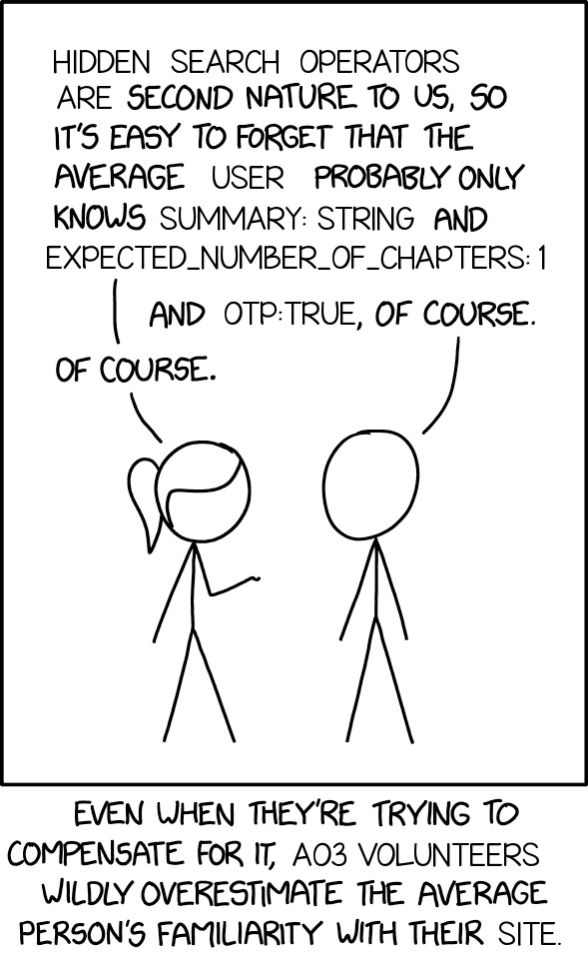
For anyone who hasn't seen them before, Hidden Search Operators are handy tricks you can use when you're either searching or filtering AO3.
summary: string is a generic way of explaining that you can search AO3 for a specific word that appears in a summary. You can do this from the search bar in the header, from the Any Field box at the top of the Advanced Search form, or from the Search Within Results box at the bottom of the filter menu.
Examples:
summary: Bruce
summary: "Bruce Banner"
summary: Bruce OR summary: Banner OR summary: Hulk
You need to put quotation marks around your search term if it is more than one word. The quotes make sure that the site searches for those two words together.
The other two operators listed work best in the Search Within Results box.
expected_number_of_chapters: 1 will return results where every fic has only 1 chapter currently posted.
You can use expected_number_of_chapters: -1 if you want results where every fic has more than 1 chapter currently posted.
otp:true will return results where there is only 1 relationship tag on the fic. If you want results where there are 2+ relationship tags (and no fics with only 1 relationship tag) then you can use otp:false
14K notes
·
View notes
Text
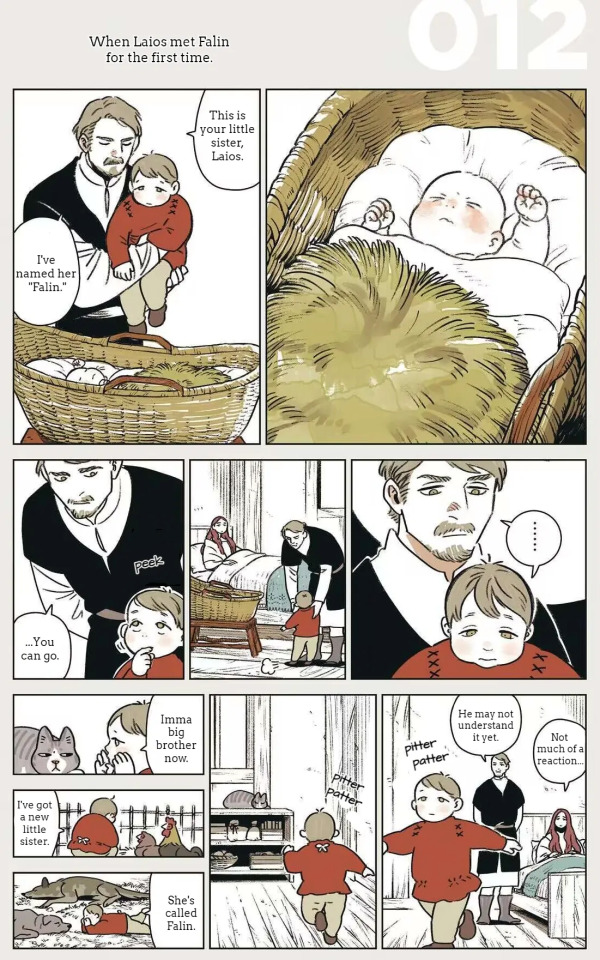
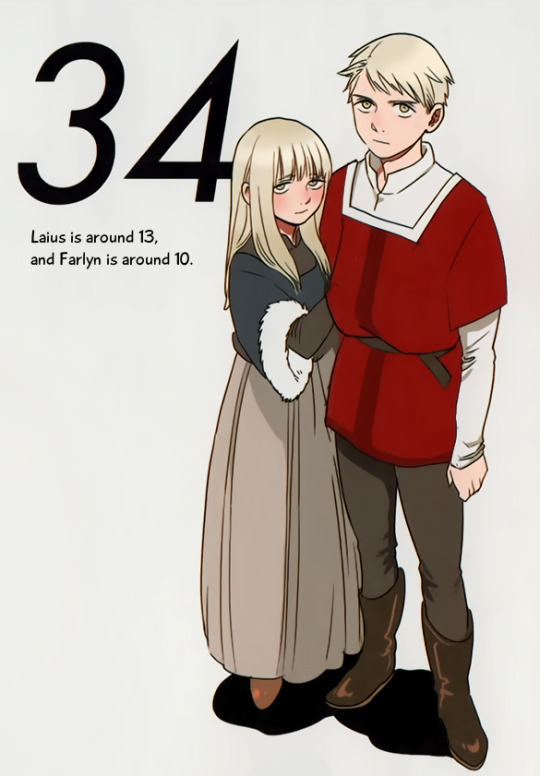
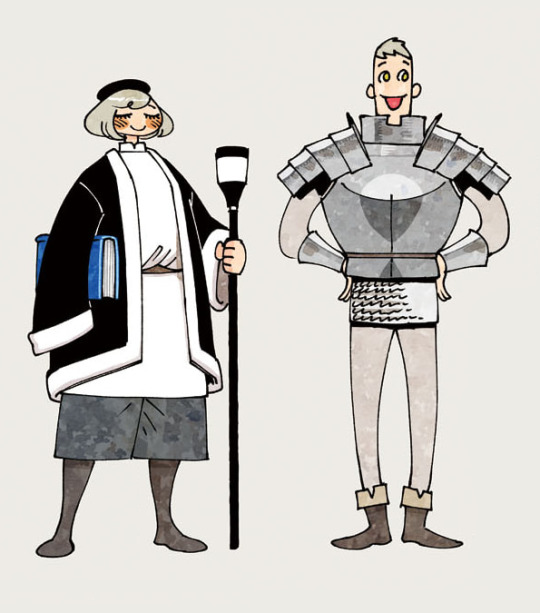


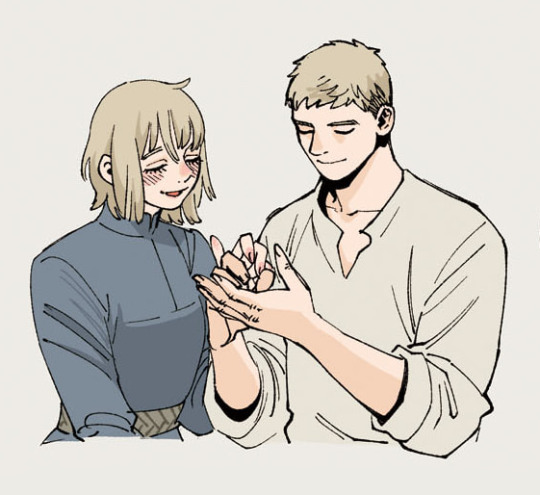
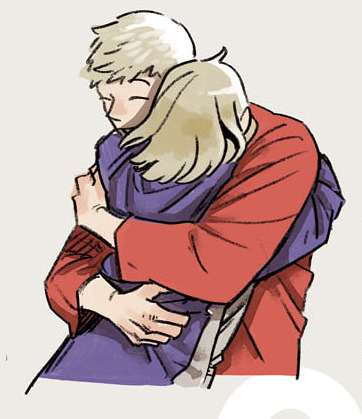
Dungeon Meshi - Laios & Falin
17K notes
·
View notes
Text
Thanks for the question, Anon!
For me, I only go braless at home, even if others are there.
-submit your poll!-
#only at home regardless of who's there#but even then it depends. if i've been going braless all morning i need to put one on for the sake of comfort. no bra hurts#but if i've had one on all day then i need to take it off for the sake of comfort. cause squishing them into a bra also hurts#the glorious balancing act of making sure my boobs have equal parts support and freedom so they don't revolt and attack and kill me#it's like trying to govern a small country. that just consists of my two boobs
2K notes
·
View notes
Text
so far I'm seeing a lot of "brown, he's just a normal guy" and "red cause brown is boring >:(" and i see where both are coming from but c'mon. you really gonna do my beautiful brown-eyed people out there like that??? I'm forever a brown-eyed Mob truther. that's more fun to me XD
still, I'm really enjoying all the different ways people are describing it in the notes! I'm having a blast reading all that. it's like little mini fanfics just about eye color. excellent work y'all
I'm wishing I worded a couple things in the poll differently (just for my own sake, I haven't seen anyone comment on these to complain).
first, I know camera flash affects the pupil cause the light is bouncing off the retina or whatever so maybe that wasn't the best example. in my mind, though, it's similar to that but with the iris instead.
related to that, I wish I hadn't been so specific with the second option. is the light reflecting? are his eyes actually glowing? something else? this is why I'm glad people are elaborating in the tags XD
I also saw one or two people mention brown with a reddish tint, which is also interesting, and I guess I'd lump that under brown, but it might be cool to have a separate option for that too.
i've been thinking about this recently and i need to hear people's opinions:
50 notes
·
View notes
Text
i've been thinking about this recently and i need to hear people's opinions:
#pickle pontificates#mp100#mob psycho 100#shigeo kageyama#i saw a couple fanfics describe them as red recently but my personal headcanon has always been the second answer#so i'm curious to know what the general consensus is
50 notes
·
View notes
Photo
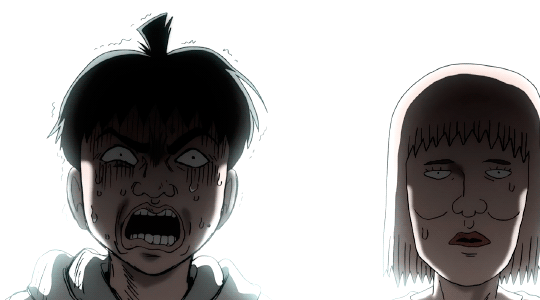

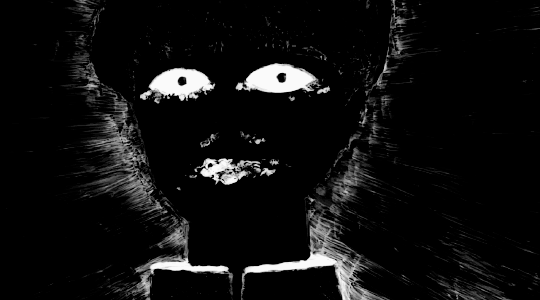
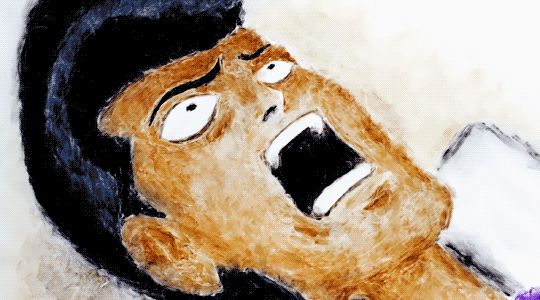



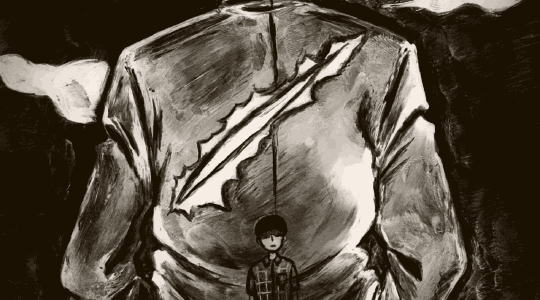

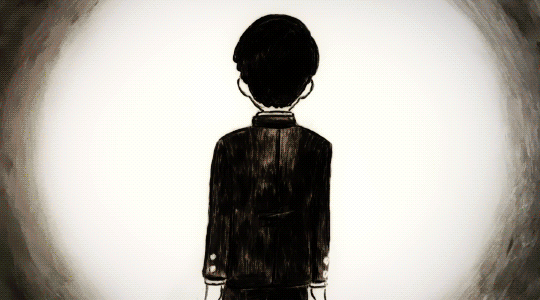
Paint-on-glass animation is a technique for making animated films by manipulating slow-drying oil-paints on sheets of glass as the animator gradually alters the shapes they create, and during this process, a camera records each finished ‘frame’.
When adapting ONE’s Mob Psycho 100, director Yuzuru Tachikawa wanted to adapt the source material in fantastic ways. And so, by combining the talents of a skilled staff, an anime with an incredible mix of animation techniques was born.
Mob Psycho’s ending, and a good portion of the paranormal scenes are a complex product of paint-on-glass animation, done by Miyo Sato, a Tokyo University of Arts graduate and animator who has had her work nominated for multiple international animation awards.
83K notes
·
View notes
Text

@insidiousink hope it's okay for me to peer review this and put it here but this wordplay with "extra" is so perfect and it brings me so much joy.
Kind of hilarious to me how poorly the title "Mob Psycho 100" localized to English-speaking areas. To someone whose first language is English, it scans as:
Mob (Yakuza, Mafia)
Psycho (violent person with "crazy" behaviors)
Thus: a particularly violent member of organized crime.
But in Japanese it scans as:
Mob (background characters in crowd scenes in manga or anime)
Psycho (short for psychic)
Thus: a psychic who looks/acts like someone you'd never pick out of a crowd scene in a comic.
#mp100#not sure if it's trying to appeal to weebs or if it's one of those cases where the publisher/author/someone else on the JP side of things#is the one who decides the title#and it ends up being less than ideal to english speakers#but i don't actually know. i haven't been able to find any info on it
11K notes
·
View notes
Text
guys aren't comically getting their red heart covered boxers exposed after they get their pants pulled down anymore. Due to wokeness
37K notes
·
View notes
Text
this is assuming its on art you normally wouldn't jump to reblog. i myself only rb stuff i really really like so .
The 'rude/demanding' tone would be stuff along the lines of "if you like but don't reblog I'll [threat]" which i see surprisingly often, both serious and more silly
#it makes me anxious and frustrated and i don't wanna spread those vibes to my followers. so no thank you.#a little reminder like ''reblogs are appreciated!'' is great tho#edit cause i'm still thinking about this:#it also makes me actively less likely to interact with it at all#a lot of the time on tumblr i'm lurking and liking. sometimes bc it inexplicably takes extra spoons to reblog#and sometimes just bc i don't really want the thing archived on my blog for a whole host of reasons (cool art but disagree with a hc)#(or maybe it's got a ship or more gore or nudity than i typically reblog. or who knows what)#but i'm still gonna slap the like button as i zoom on past as a little ''hey! i see you! nice!!'' kinda thing bc i can#but if i see that ''likes do nothing reblog or die by my sword'' well now i am not interacting at all#and i say this as somebody who posts fics and art and loves interaction#i get that it's hard out there but i'd rather have something flop than guilt someone over not enjoying my thing the right way#or give them anxiety when it's supposed to be bringing them joy
4K notes
·
View notes
Text
On the Identity of "Chat"
Like all the linguistics folks on Tumblr, I've been sent the "chat is a fourth person pronoun" post by a bunch of well-meaning people and and I've been thinking waaay too much about it. @hbmmaster made a wonderful post explaining exactly why "chat" ISN'T a fourth person pronoun, and after reading it I wanted to go a little deeper on what it might actually be doing linguistically, because it is a really interesting phenomenon. Here's a little proposal on what might be going on, with the caveat that it's not backed up by a sociolinguistic survey (which would be fun but more than I could throw together this morning).
On Pronouns
Studying linguistics has been really beneficial for me because understanding that language is constantly changing helped me to become comfortable with using they/them pronouns for myself. I've since done a decent amount of work with pronouns, and here are some basic ideas.
A basic substitution test shows that "chat" is not syntactically a pronoun: it can't be replaced with a pronoun in a sentence.
"Chat, what do we think about that?"
"He*, what do we think about that?" (* = ungrammatical, a native speaker of English would think it sounds wrong)
Linguists identify pronouns as bundles of features identifying the speaker, addressee, and/or someone outside the current discourse. So, a first person pronoun refers to the speaker, a second person pronoun refers to the addressee, and a third person pronoun refers to someone who is neither the speaker nor the addressee (but who is still known to the speaker and addressee). This configuration doesn't leave a lot of room for a "fourth" person. But the intuition people have that "chat" refers to something external to the discourse is worth exploring.
Hypothesis 1: Chat is a fourth-person pronoun.
We've knocked this one right out.
Hypothesis 2: Chat is an address term.
So what's an address term? These are words like "dude, bro, girl, sir" that we use to talk to people. In the original context where "chat" appears - streamers addressing their viewers - it is absolutely an address term. We can easily replace "chat" with any of these address terms in the example sentence above. It's clear that the speaker is referring to a specific group (viewers) who are observing and commenting on (but not fully participating in) the discourse of the stream. The distinction between OBSERVATION and PARTICIPATION is a secret tool that will come in handy later.
But when a student in a classroom says "wow chat, I hate this," is that student referring to their peers as a chat? In other words, is the student expecting any sort of participation or observation by the other students of their utterance? Could "chat" be replaced with "guys" in this instance and retain its nuance? My intuition as a zillenial (which could be way off, please drop your intuitions in the comments) is that the relationship between a streamer and chat is not exactly what the speaker in this case expects out of their peers. Which brings me to...
Hypothesis 3: chat is a stylistic index.
What's an index in linguistics? To put it very simply, it's anything that has acquired a social meaning based on the context in which it's said. In its original streaming context, it's an address term. But it can be used in contexts where there is not a chat, or even any group of people that could be abstracted into being a chat. Instead, people use this linguistic structure to explicitly mimic the style which streamers use.
And that much seems obvious, right? Of course people are mimicking streamers. It doesn't take a graduate degree to figure that out. What's interesting to me is why people choose to employ streaming language in certain scenarios. How is it different from the same sentence, minus the streamer style?
This all comes down to the indexicality, or social meaning, of streamer speak. This is where I ask you all to take over: what sorts of attitudes and qualities do you associate with that kind of person and that kind of speech? I think it has to do with (here it comes!) the PARTICIPANT/OBSERVER distinction. By framing speech as having observers, a speaker takes on the persona of someone who is observed - a self-styled celebrity. To use "chat" is to position oneself as a celebrity, and in some cases even to mock the notion of such a position. We can see a logical path from how streamers use "chat" as an address term to how it is co-opted to reference streamer culture and that celebrity/observer relationship in non-streaming mediated discourse. If we think about it that way, then it's easy to see why the "fourth person pronoun" post is so appealing. It highlights a discourse relationship that is being invoked wherein "chat" is not a group but a style.
1K notes
·
View notes
Text
I think that people who say "chat is a pronoun, actually" or say that it's prescriptivist or stifling creativity or language development are fundamentally misunderstanding what parts of speech are and how prescriptivism and descriptivism work. there's a huge difference between saying "you can't use neopronouns" or "you can't end a sentence with a preposition" and "chat is not a pronoun." the former two are prescriptive statements, the latter is literally descriptive.
in the first two cases, you're trying to tell people what they can and cannot do regardless of actual usage. people end sentences with prepositions all the time, and even though it isn't mainstream right now, there are established communities of people who use neopronouns.
"chat is not a pronoun," on the other hand, is a statement that describes current actual usage. (rest of the post under the cut: it's very long)
currently, no one is using chat as a pronoun. could someone use it as a pronoun? sure! of course they could! you could theoretically use any combination of sounds to fulfill any function. but that's irrelevant to the debate because "chat is not a pronoun" does not in any way entail the statement "chat can never ever foreseeably be a pronoun." it is just saying that right now, chat is not a pronoun because no one is using it like a pronoun: no more and no less. in none of the examples that I have seen provided has it been used like a pronoun. "chat is not a pronoun" also doesn't negate the possibility that there may be something cool going on socially! it's just not in terms of grammar categories. whatever's going on is a different kind of beast.
another very important thing I feel like a lot of people are misunderstanding is what parts of speech are. their entire purpose is to categorize language and study it, NOT to box it in. we HAVE to name these guys and try to classify them and study how they are alike and different, or we would not be able to talk about language and study it at all. think of it like animal classification: we're trying to sort through a preexisting system of something that exists (language or living organisms) and show how it all fits together. there are infinite complexities to how it all works and it takes an insane amount of study to figure out whether something belongs in one category, another, or needs a new label to accurately categorize it at all. pluto is not a planet and tomatoes are a fruit no matter WHAT kind of ""vibes"" they give off to you because "planet" and "fruit" are terms that scientists need to have precise definitions so they can talk about them. if you expand categories like "noun" or "verb" or "conjunction" to just include whatever, then you've removed your ability to talk about things with precision.
and also, parts of speech are not created by saying, "we should have nouns. okay gang, go out there and put all the words we ought to use as nouns in the noun box. if anyone uses one of those for anything other than a noun, we kill them." no. you look at sentences and the preexisting English language and you say, "boy, it seems like there sure are a lot of words that people use to label people, places, things, and concepts. in terms of syntax, we tend to place them in the subject or object position, and they don't necessarily contain information about the specific properties of how the object, person, or concept looks or moves. they can also be inflected to show that there's more than one, and there seems to be a set amount of endings you can use to do that. you can swap them out for one another and the sentence will stay grammatically correct. let's call these nouns!"
^THIS IS DESCRIPTIVISM. it is the reason why we're constantly updating dictionaries. "Stan" started out as a proper noun: the name of a guy. people started using it like a common noun to describe obsessive fans, and guess what? now it's a common noun! and then a little bit later, it got verbed! people started using it to describe the action or behavior of being an enthusiastic or obsessive fan! and now it's a verb! look it up in Merriam-Webster right now, those definitions are in there. any word can get turned into anything if we start using it that way.
the real issue here is that most people are familiar with nouns and verbs. this is not enough. pronouns have been amassing clout lately, and if you paid attention in English class or were really into Mad Libs as a kid, you might also be familiar with adjectives, adverbs, conjunctions, prepositions, and articles. I was both an English and a Mad Libs kid! imagine my shock and horror when I started college and got exposed to the horrors of the intricacies of tense, aspect, and modality in verbs, nominalization, the nightmare of actually trying to pin down what an adverb even is, all the little subcategories like vocatives and demonstratives... and THEN I decided to do a linguistics minor along with my English major and was forced to realize that although there's a lot of shared terminology and overlap between traditional English parts of speech and linguistic lexical/syntactic categories, both fields make these categorizations for slightly different purposes, so sometimes the terminology and categorization is different. AND PEOPLE ARE DISPUTING THINGS. ALL THE TIME.
HOWEVER.
these disputes are so much more infinitely nuanced then you are even capable of realizing if all you know is the basic eight parts of speech or whatever that they teach you in school. OF COURSE if your understanding of grammar only extends to nouns, verbs, adjectives, and pronouns, you're going to say stuff like "chat is a pronoun." it's like trying to diagnose someone with a mental illness when all you know is ADHD and depression. it's like trying to identify fossils when you've never seen an animal with the skin off. it's like that stupid argument about whether a hot dog is a sandwich or a taco or whatever that was about, which is a fun mental exercise, I guess, but the real answer is that yeah I guess you could say anything with some type of flat processed baked grain base is a sandwich, but the real and useful answer is that we make distinctions between hot dogs, tacos, sandwiches, flatbreads, open-face sandwiches, ravioli, burritos, wraps, and so on because WE NEED SPECIFICITY IN ORDER TO TALK ABOUT THINGS IN REAL LIFE.
i'm not an expert. all i have is a bachelor's degree in English, and i took grammar-related classes on purpose. you know what that equipped me to do upon seeing the initial post? it equipped me to go "that doesn't sound right" and then to go look up some expert opinions to explain why I felt that way and whether it was right or wrong.
so if I can beg you all to do one thing: please, please go on Wikipedia and read about the vocative case and the page on the parts of speech (this link will take you to the part where they talk about how linguists have different classification methods because it's very complex). what I want you to take away from this is that a) modern linguists and grammarians are, for the most part, very aware of how messy things can get and willing to make adjustments, and that b) "chat is a pronoun" is not one of those cases because it already falls perfectly into a category.
and I lied, because there is also a second thing I beg you all to do: realize how easy it is to be dogmatic when stuff seems simple. realize that everything is more complicated than it looks. realize nothing is black and white. realize everything is infinitely layered. and remember that although we're all human, there are always people out there who know more than you, and if you shut your eyes and cover your ears you are closing yourself off to ever being able to understand anything just so you can stay in your little paper cutout dimension where things make sense.
#pickle pontificates#i'm putting this out here because it's been simmering and i spent all this time writing it and i'm tired but.#like. for all that like i said i'm also not an expert. i'm willing to be proven wrong or nitpicked#i'm just sick of people metaphorically insisting that the ocean can't be deep because they went to the beach and only waded to their knees
2 notes
·
View notes
Text
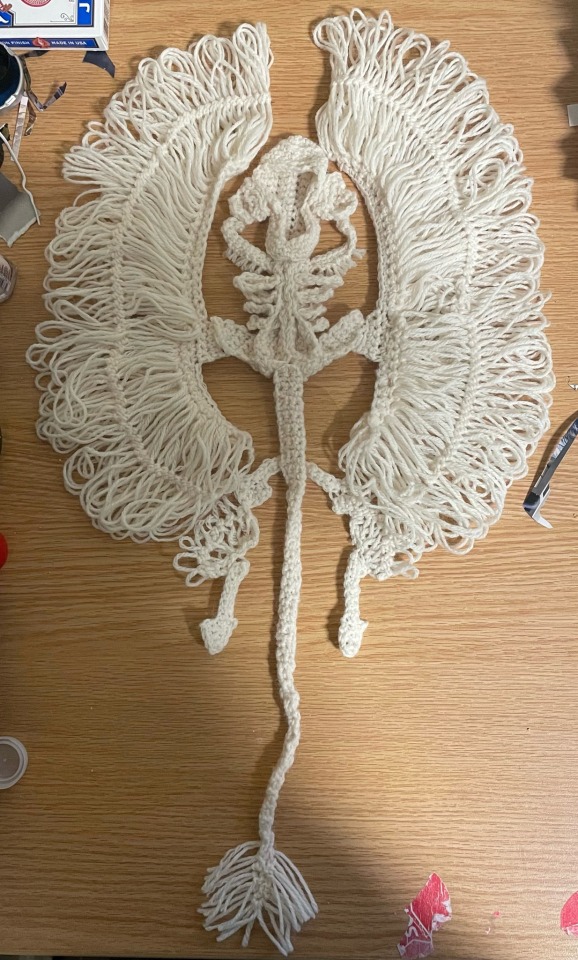
Fuck it. Crochet cartilaginous stingray skeleton
7K notes
·
View notes
Text
When people get a little too gung-ho about-
wait. cancel post. gung-ho cannot be English. where did that phrase come from? China?
ok, yes. gōnghé, which is…an abbreviation for “industrial cooperative”? Like it was just a term for a worker-run organization? A specific U.S. marine stationed in China interpreted it as a motivational slogan about teamwork, and as a commander he got his whole battalion using it, and other U.S. marines found those guys so exhausting that it migrated into English slang with the meaning “overly enthusiastic”.
That’s…wild. What was I talking about?
28K notes
·
View notes
Text
April 27
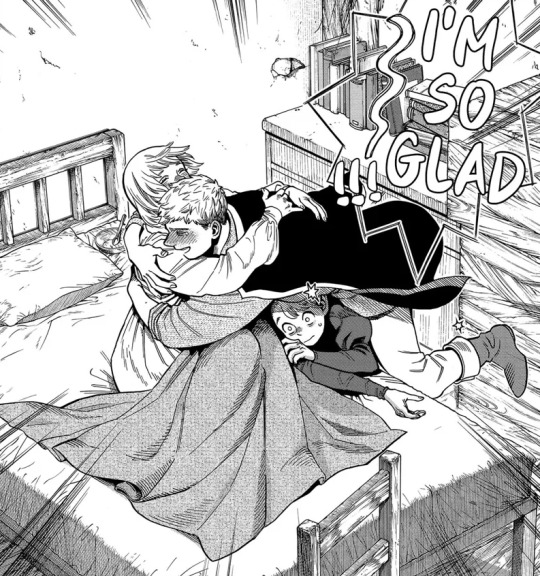
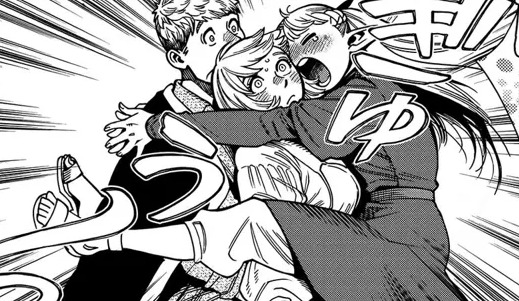

Today in Dungeon Meshi: Falin wakes up.
706 notes
·
View notes




